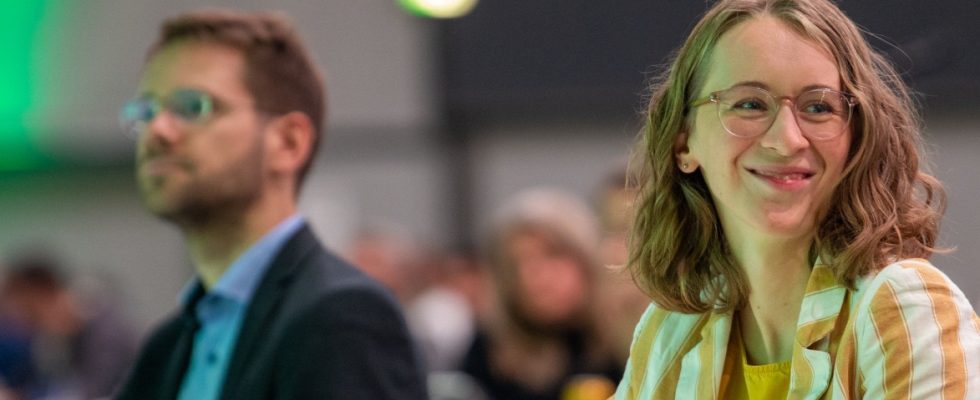The Bavarian Green Party leaders Eva Lettenbauer and Thomas von Sarnowski are running for re-election. The two will apply for their positions again at a party conference in Lindau at the end of January. However, there is a candidate for the female position in the dual leadership: the former state parliament member Gisela Sengl also announced her ambitions. This is unusual; the Greens have not had any challengers to incumbent chairmen for a long time. At the party conference there is also a risk of a fundamental debate about whether the poor performance in the state elections in rural areas has been adequately dealt with and how this negative trend could be broken.
The Bavarian Greens have had twelve miserable months. They started the state election year with the goal of expanding on their 2018 result (17.6 percent) and getting at least 20 percent. In the end it was only 14.4 percent. The party was able to assert itself strongly in Munich, but in the countryside the Greens were met with rejection in many places. In Lower Bavaria and Upper Palatinate, the party performed in single digits, and in some voting districts it landed around the five percent hurdle. Some Greens in the countryside fear the fatal aura of a “Munich party”. A good third of the MPs now come from the city and district of Munich, some other regions are no longer represented in the parliamentary group.
Eva Lettenbauer, 31, has been at the top of the party since 2019. The member of the state parliament does not see the result as defeatist. “We have the ideas for a good life, fought for every percent in the state election campaign and held up very well,” she told the SZ. It is a “strong result” given the strong headwinds. “Unfortunately, our messages have not penetrated everywhere in rural areas. We need to become more present and we are working on that.” One key is continued membership growth. In 2023, Bavaria’s Greens reached the 20,000 mark. In an application letter, she also refers to measures that have already been decided on for strong structures in rural areas, for example the expansion of regional management.
Gisela Sengl, former member of the state parliament and organic farmer in the Traunstein district, is running against Eva Lettenbauer.
(Photo: Hartmut Poestges/Hartmut Poestges)
Lettenbauer attributes the election result to the “populist mood” in the country and to an anti-traffic light vote. There was hardly any objective discussion about topics; instead, the CSU and FW had “distraction debates” such as about language and food. “People don’t care what their neighbor eats or how they talk” – they are more interested in cheap electricity from wind and sun or in maintaining the local family doctor’s practice. The fact that Prime Minister Markus Söder (CSU) portrayed the Greens as the “enemy” is “not acceptable among Democrats and is pouring grist on the AfD’s mill.”
Katharina Schulze and Ludwig Hartmann have different preferences
The competing application comes from the Traunstein district. Gisela Sengl, a landscape gardener with an organic shop on her own farm, was thrown out of the state parliament in the election. The 63-year-old was deputy parliamentary group leader there and sat on the agriculture committee. In her application, the analysis is more critical: In the city, her party’s politics are “firmly in the middle of society,” but “in the countryside we have lost the people who have already voted for us.” You shouldn’t “just let it happen to us” that people suddenly blame the Greens for everything. Sengl writes: Energy, transport, agricultural transition – there is a lot of innovation and pragmatism in crafts, companies and agriculture, “basically green politics is often already being implemented here in everyday life.” These “natural allies” must “be met where they are, with a willingness to listen and with a language that is understood.”
Lettenbauer, an industrial engineer by profession, also has roots in the countryside, lives in the small village of Reichertswies in northern Swabia and calls herself a “country bumpkin”. There are differences between the two candidates in terms of age. And in style: in party circles, Sengl enjoys a reputation for a rustic approach, Lettenbauer for a more intellectual approach.
Your previous co-country chief Thomas von Sarnowski, 35, from Ebersberg is also running again. No opposing candidatures have yet been made public, although the registration period is still running. In general, the Green leadership is less in the spotlight than the parliamentary group leadership and cares more about organization. Former country boss Eike Hallitzky once defined it as “not four superstars.” At that time, this referred to the dual leadership of a duo in the party and the parliamentary group. What has now changed: In October, Katharina Schulze was elected sole parliamentary group leader, probably in anticipation of a solo top candidacy for the 2028 state elections. Ludwig Hartmann, previously in tandem with Schulze in the parliamentary group leadership, moved to the more representative office of state parliament vice-president .
The positioning of the two regarding the upcoming candidacy is remarkable. Schulze left in Munich Mercury infer a gentle preference. She worked well with Sengl and “particularly intensively and trustingly” with party leader Lettenbauer during the election campaign. Hartmann was obviously campaigning for the challenger. With her candidacy, Sengl is making a good offer to close a gap in the leadership of the Greens that became very clear in the state election campaign.

